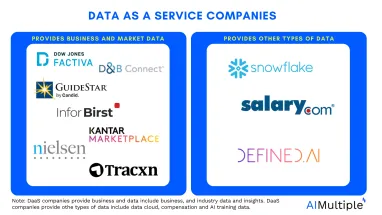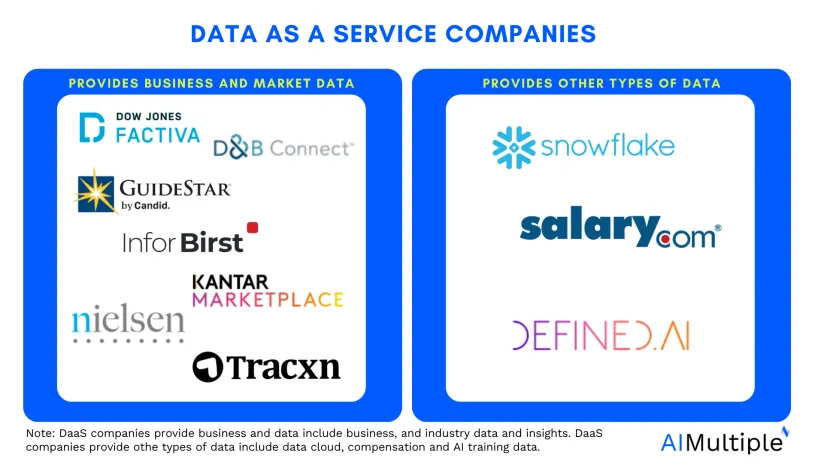Data fuels generative AI and enterprise innovation. Data as a Service (DaaS) is a cloud computing model that provides data on demand to users, usually on a subscription basis. This streamlines data collection and management.
See top 10 data as a service companies and data types they provide, the key features such as data analytics and benefits of the DaaS model:
Top 10 DaaS providers
| Vendors | Ratings* | Basic Pricing** | Free Trial | Free Version | Data Types |
|---|---|---|---|---|---|
| Coresignal | 4.8 out of 12 reviews*** | $49/mo | ✅ | ✅ | Company, employee and job posting |
| Candid GuideStar | 4.1 out of 2 reviews | $183 for annual payment plan | ✅ | ✖ | Business data and insight |
| Snowflake | 4.5 out of 560 reviews | $23 per TB | ✅ | ✖ | Data cloud |
| Tracxn | - out of - reviews | $300 for annual payment plan for & 11 user deal | ✅ | ✅ | Business data and insight |
| Kantar Marketplace | 4.4 out of 9 reviews | $4,167 for annual payment plan | ✖ | ✖ | Market data and insight |
| Nielsen Marketing Cloud | 4.3 out of 38 reviews | N/A | ✖ | ✖ | Market data and insight |
| Salary.com | 4.4 out of 514 reviews | N/A | ✖ | ✖ | Salary and compensation data |
| Factiva | 3.6 out of 67 reviews | N/A | ✖ | ✖ | Business news and profiles |
| D&B Connect | - out of - reviews | $18 for annual payment plan | ✖ | ✖ | Business data and insight |
| Defined.AI | - out of - reviews | N/A | ✖ | ✖ | AI training data |
| Infor Birst | 4.0 out of 340 reviews | N/A | ✖ | ✖ | Market data and insight |
*The data was gathered from vendor websites as well as review platforms.
**Per month, per user. N/A means that the vendor doesn’t publicly share its pricing.
***Coresignal’s review and rating data is sourced from Datarade, as they lack user reviews on platforms like G2, TrustRadius, and Capterra, unlike the other vendors included in the table.
Key data as a service vendor features
Data as a Service companies specialize in collecting, managing, and delivering data to users, enabling them to access and utilize the data without the need for internal cloud infrastructure.
DaaS companies offer various functions, such as:
1. Data Provisioning
Data as a Service (DaaS) providers offer access to a diverse range of datasets, often sourced from various channels such as public databases, proprietary sources, or data aggregators. This addresses specific data needs that may be challenging to fulfill independently. Businesses mostly lack the tools, expertise, or direct access to required data, DaaS providers streamline the process.
These services eliminate the complexities of permissions and data collection, allowing businesses to focus on deriving insights and value from the acquired datasets.
2. Data Management
Data as a Service companies excel in managing data by handling the storage, organization, and maintenance of large datasets. Beyond these fundamental aspects, they navigate the complex landscape of data permissions, ensuring compliance with regulations and addressing the nuances of data access rights. This includes securing necessary permissions and managing data in a way that aligns with legal requirements
DaaS platform also handles the data security risks of sensitive data in a more efficient way.
3. Data Analytics
Some DaaS providers offer data analytical tools and services, allowing users to derive insights from the organization’s data they access. This may include tools for business intelligence, predictive analytics, and machine learning.
4. Application Programming Interfaces (APIs)
Data as a Service companies often provide APIs that allow users to integrate the business data directly into their applications, workflows, or systems. This functionality empowers businesses to harmonize their existing processes with the wealth of data offered by DaaS providers, fostering enhanced operational efficiency, real-time insights, and increased adaptability to evolving business needs.
5. Scalability
DaaS are scalable, meaning users can adjust their data usage based on their evolving needs. This flexibility is particularly beneficial for businesses with changing data requirements. Moreover, unlike other data collection methods such as web scraping tools, DaaS eliminates the need for a dedicated IT team to manage the process of obtaining the required data.
These services save time and effort by providing the need of the business, and also enhance decision-making accuracy and efficiency for businesses by providing timely data.
6. Subscription-Based Model
DaaS is typically offered through a subscription-based model, allowing users to pay for the data services they use. Businesses may negotiate with DaaS provider for the data that fits their needs, rather than investing in and maintaining their own data infrastructure. This enables users to pay only for the specific data services they utilize and offers cost savings.
Benefits of Data as a Service companies
DaaS empowers organizations by streamlining data processes, fostering a data-centric culture, and providing cost-effective access to valuable information, ultimately contributing to improved decision-making and business success.
1. Efficient data storage and delivery
DaaS leverages cloud infrastructure to store and deliver data, eliminating the need for organizations to invest in and maintain extensive internal data storage systems. This service spares businesses from the hassle of dealing with concerns such as available cloud space.
2. Data democratization
DaaS plays a pivotal role in democratizing data by making it accessible and understandable for individuals across the organization, even those without technical expertise. This accessibility fosters a data-driven culture where insights are available to a broader audience, enabling better decision-making at all levels.
3. Monetization opportunities
DaaS opens up avenues for organizations to monetize their data assets.
- Direct monetization involves earning revenue by selling data to third parties.
- Indirect monetization is the usage of the data to extract valuable business insights.
This dual approach allows businesses to diversify revenue streams and capitalize on the intrinsic value of their data.
4. Automated maintenance
Data as a Service companies take on the responsibility of automated data maintenance, ensuring that data sets remain current, accurate, and reliable. Automation of maintenance enhances the efficiency of data management processes and also frees up resources within organizations to focus on core business activities.
5. Personalized services
The abundance of data available through DaaS enables organizations to create more personalized and targeted services. By analyzing consumer behavior and preferences, businesses may strategically tailor their marketing approaches, fostering increased customer engagement and satisfaction.
Understanding individual purchase histories and preferences, for instance, enables companies to provide custom recommendations, creating a more personalized and satisfying shopping experience for customers.
6. Cost-Effective data acquisition
DaaS offers a cost-effective alternative to traditional data acquisition methods. Instead of investing in large datasets with excessive information, organizations can selectively purchase the specific data they need. This targeted approach minimizes costs associated with data processing and analysis, making data-driven initiatives more budget-friendly.
Eliminating the need for organizations to invest in and maintain extensive internal data storage also reduces costs associated with hardware and maintenance.
How Data as a Service Companies Help B2B and B2C Sectors
DaaS platforms extend their solutions to various business domains, providing data consumers with diverse datasets, including anonymous multi-channel, social, and enterprise data. The widespread adoption of data in business has quickly become integral, offering on-demand solutions through Data as a Service (DaaS) platforms across diverse industries.
In the Business-to-Business (B2B) sector, companies utilize DaaS providers to enhance datasets, enabling improved market segmentation and advanced analytics with on-demand firmographic information. This encompasses real-time insights sourced from public records, including recent funding details or newly established locations, empowering businesses with timely and relevant information for strategic decision-making.
In the Business-to-Customer (B2C) sector, data services contribute significantly to delivering timely and relevant information, enhancing the overall customer experience by ensuring access to fresh and rare insights precisely when needed.
The utilization of data services in the B2C domain proves instrumental in optimizing marketing strategies, improving customer engagement, and fostering more personalized interactions between businesses and their customers.
How to Choose the Best Data as a Service Software for Your Business
When evaluating Data as a Service (DaaS) software solutions for enterprise adoption, industry analysts emphasize several critical factors that contribute to the overall suitability and efficacy of the platform within a business environment.
1. Determine the needs of your company
Before embarking on the search for a data solutions provider, it’s essential to define your specific data needs and business goals. Identify the type of data you want to work with, understand key challenges, and establish the objectives you aim to achieve through data solutions. This clarity will streamline the selection process, enabling you to identify Data as a Service companies that align with your unique requirements.
2. Examine user experience
Another important step of deciding the best DaaS for your business is examining user experiences. User experience and ratings play an important role in assessing the overall usability and effectiveness of DaaS solutions. Assessing the overall usability, performance, and flexibility of the DaaS software helps determine how well it integrates with your existing workflows.
3. Check the simplicity and ease of the product
When choosing a Data as a Service (DaaS) solution, prioritize simplicity, seeking a fully managed platform that alleviates concerns about systems, applications, and user interfaces. One factor determining the best DaaS for your business is choosing a user-friendly interface that is intuitive and easy to use for a diverse range of users.
4. Evaluate the customer service
Effective customer service is a crucial factor while deciding the best DaaS platform for your business. It ensures timely technical support, aids in customization and integration, provides training and onboarding assistance, resolves issues promptly, and values customer feedback for continuous improvement.
A strong customer service system enhances the overall experience of using DaaS, offering vital support for seamless implementation and optimal utilization.




Comments
Your email address will not be published. All fields are required.